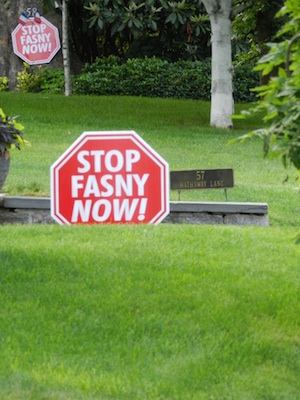Judge dismisses lawsuit challenging FASNY school approval

A civic group’s challenge to the approval of a new French-American School of New York campus at the former Ridgeway Country Club in White Plains has been dismissed in state supreme court.
A 26-page decision from State Supreme Court Judge Joan B. Lefkowitz on Aug. 24 rejected argument from a neighborhood group that the city did not follow required procedure in reviewing the development proposal.
FASNY received approvals from the White Plains Common Council last year to build a 640-student school for grades six through 12 on part of a 129-acre property previously home to the Ridgeway Country Club. But that approval was challenged in court months later in a lawsuit led by the Gedney Association, a group representing the adjacent Gedney Farms neighborhood, against the city’s Common Council and FASNY.
Part of the lawsuit’s argument against the project’s approval focused on a covenant added to the deed of the property when it was sold to become a golf course in 1925. The covenant contained language, the plaintiffs argued, prohibiting the use of the property for “any institution, other than a club.” The city’s Common Council, the neighbors then argued, failed to consider that covenant in its review of the school.
In denying that claim, Lefkowitz noted that courts will only enforce covenant restraints if their “existence has been established with clear and convincing proof.” If there’s ambiguity, a covenant should be interpreted to its limit, rather than extended by the court.
The 1925 deed’s covenant does specifically restrict certain uses, such as the manufacture and sale of alcohol, medical and psychiatric treatment facilities, and homes for the “poor and destitute.” But there is no specific mention of educational facilities.
The neighbors argued that a later line in the covenant prohibiting “any noxious, offensive, undesirable or dangerous trade, manufactory or occupation or any nuisance whatsoever” should also be interpreted as a prohibition on the school. Lefkowitz described that language as vague and subjective, requiring interpretation in “favor of the free use of land.”
An educational facility does not constitute a noxious use on its own, Lefkowitz said. In a footnote, the judge added that courts have previously found educational facilities to have a beneficial impact on their communities.
The case represents just the latest in an eight-year legal saga surrounding FASNY”™s proposal. FASNY purchased the defunct golf course in 2010 for $11 million. A year later, the school came to the city with its original, $60 million plan to consolidate its three Westchester campuses there.
The original plan would have covered students from preschool through 12th grade and include a 78-acre public park maintained by the school.
The proposal has faced steady opposition from some city residents, led by the Gedney Association. The association represents about 450 households in the Gedney Farms neighborhood near the golf course. The group first challenged the city”™s review of the project in court in 2014, but its Article 78 appeal was ruled not legally ripe by Lefkowitz, as the city had not yet reached a decision on the FASNY proposal.
The next legal showdown came between FASNY and the city. The school challenged the city”™s review process in state Supreme Court in September 2015, a month after the Common Council voted down a motion to close a part of Hathaway Lane near the property. The road closure was required as a mitigation measure in an environmental impact statement previously approved by the council.

In April 2016, Lefkowitz, again presiding over a FASNY-related case, accused the council of waging a “war of attrition” through a protracted review process.
Five months later, the Common Council approved a settlement to review a reduced plan from FASNY, with oversight from the state court.
In November, the city approved the scaled-back proposal from FASNY. The plan decreased the number of students from the original 950 to a maximum of 640 and limited students to grades six through 12. The approval included a 15-year moratorium on any expansion of school facilities on three parcels of the property not used by the campus.
The latest decision from Lefkowitz rejected a series of claims questioning the validity of the Common Council’s review of the project.
The neighbors argued that the city engaged in improper segmentation of the school’s environmental review by failing to consider the cumulative effect of all potential stages of development. While school construction is only permitted on one of the property’s four parcels, the neighbors argued FASNY will eventually pursue its initial plan to consolidate all of its schools onto the single campus.
The judge called this “rank speculation based on hypothetical circumstance,” noting that FASNY had agreed to a 15-year moratorium on developing any other part of the campus.
The lawsuit also argued that the city did not consider a traffic report from a Gedney expert that conflicted with the traffic impact findings from FASNY’s experts. Lefkowitz said the city did make the Gedney report part of the public record. While conducting an environmental review, Lefkowitz said, an agency has “discretion to choose between conflicting experts.”
A Gedney Association representative did not respond to a request for comment. FASNY officials heralded the decision in a statement released to the media on Aug. 26.
“Judge Lefkowitz”™s decision confirms that the courts will sustain environmental reviews that are the product of a careful and comprehensive review of the issues,” said FASNY attorney Michael Zarin. “FASNY has demonstrated great commitment to its constituents and to the larger community, and we are very proud to have been part of this long journey.”